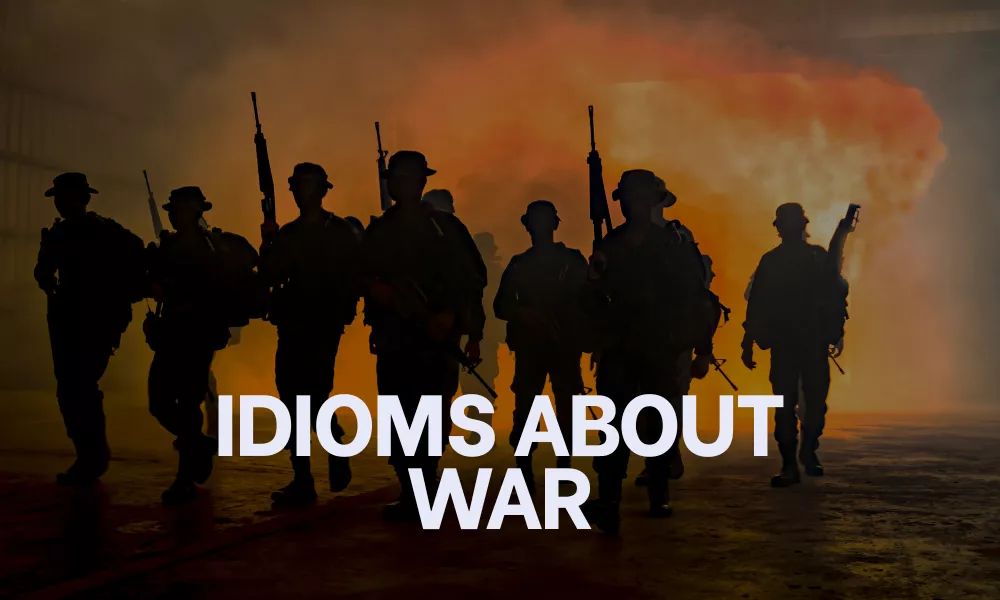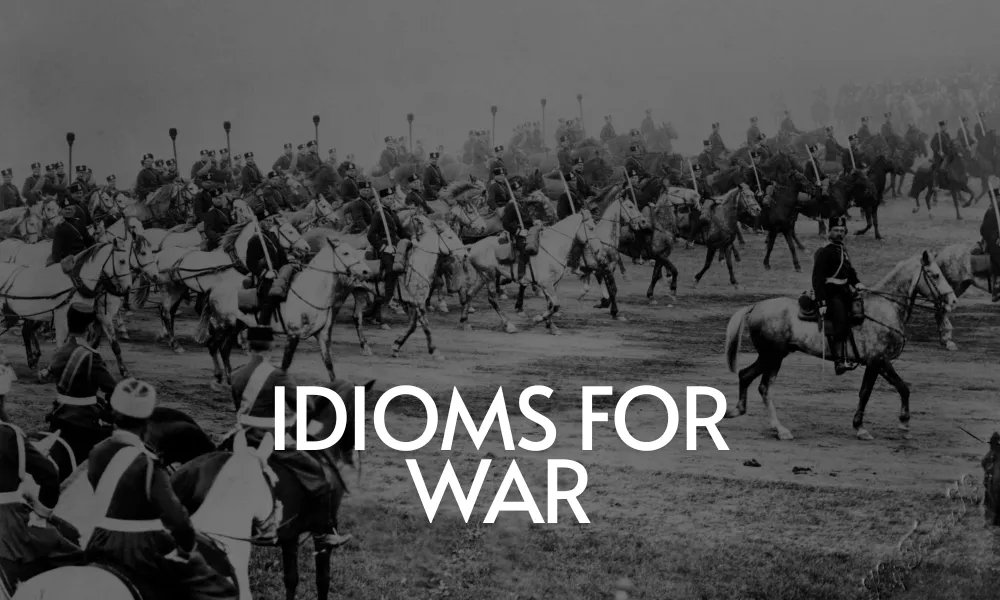Powerful Idioms About War With Meanings And Examples

Language has long mirrored the realities of human conflict, and the world of war is no exception. Idioms about war transform the battlefield into a metaphorical space where words act as weapons and expressions capture the intensity of struggle, strategy, and survival. From “rallying the troops” to “fighting tooth and nail,” these vivid phrases draw from centuries of combat experience to describe determination, rivalry, and resilience in everyday life. Exploring these idioms not only enriches our understanding of language but also reveals how the echoes of warfare continue to shape communication.
What Are Idioms About War?
Idioms about war are expressions that borrow imagery and concepts from military life, battles, and strategy to describe everyday situations of struggle, competition, or determination. These idioms don’t refer to literal warfare but use the language of conflict to express emotions, challenges, or actions in a powerful way. For example, phrases like “pick your battles” or “caught in the crossfire” symbolize decision-making and being stuck in difficult situations. Such idioms show how deeply the experiences of war have influenced communication, turning acts of combat into vivid symbols of human resilience and confrontation in daily life.

Commonly Used Idioms About War
- Fight tooth and nail
Meaning: To struggle fiercely or with great determination.
Example: She fought tooth and nail to protect her rights. - Caught in the crossfire
Meaning: To be unintentionally involved in a conflict between others.
Example: The manager got caught in the crossfire between two departments. - Pick your battles
Meaning: Choose wisely which conflicts to engage in.
Example: You can’t argue about everything, learn to pick your battles. - Raise the white flag
Meaning: To surrender or give up.
Example: After hours of debate, he finally raised the white flag. - Drop a bombshell
Meaning: To make a shocking or surprising announcement.
Example: The CEO dropped a bombshell by announcing his sudden resignation. - Bite the bullet
Meaning: To face a painful or difficult situation with courage.
Example: She decided to bite the bullet and tell the truth. - Go down in flames
Meaning: To fail spectacularly.
Example: His business plan went down in flames after the first month. - Call to arms
Meaning: A call for people to take action or unite for a cause.
Example: The leader’s speech was a call to arms for social reform. - Under the gun
Meaning: To be under pressure or time constraints.
Example: I’m under the gun to finish this project before the deadline. - Hold the fort
Meaning: To take care of things while someone is away.
Example: Can you hold the fort while I’m out for lunch? - Stick to your guns
Meaning: To stand firm on one’s beliefs or decisions.
Example: Despite criticism, she stuck to her guns about the policy change. - In the trenches
Meaning: Working hard in a difficult or challenging situation.
Example: Teachers are truly in the trenches when it comes to education. - Loose cannon
Meaning: Someone unpredictable who may cause problems.
Example: He’s a loose cannon, be careful what you share with him. - On the warpath
Meaning: Angry and ready to argue or fight.
Example: Mom’s on the warpath after seeing the mess in the kitchen. - Shot in the dark
Meaning: A guess made without much information.
Example: My answer was just a shot in the dark, but it turned out right. - Take no prisoners
Meaning: To be ruthless or relentless in achieving a goal.
Example: The new coach takes no prisoners during training. - War of words
Meaning: A heated verbal argument.
Example: The two politicians engaged in a bitter war of words. - Go to battle
Meaning: To begin a fight or intense competition.
Example: The two companies went to battle for market dominance. - Battle of wills
Meaning: A conflict between people who refuse to back down.
Example: It was a battle of wills between the teacher and the student. - Drop your guard
Meaning: To stop being cautious.
Example: Don’t drop your guard around competitors. - Armchair general
Meaning: Someone who gives advice about situations they’re not involved in.
Example: He’s an armchair general who’s never faced real challenges. - Go nuclear
Meaning: To react extremely or aggressively.
Example: She went nuclear when she found out about the mistake. - Keep your powder dry
Meaning: Stay prepared for action or opportunity.
Example: Investors are keeping their powder dry for the right time to buy. - Take flak
Meaning: To receive strong criticism.
Example: The government took flak for its poor crisis response. - A war chest
Meaning: A reserve of money or resources for future use.
Example: The company built a war chest to fund new projects. - Go ballistic
Meaning: To become very angry.
Example: He went ballistic when his car was towed. - The front line
Meaning: The most active or dangerous position in a situation.
Example: Nurses were on the front line during the pandemic. - Battle-tested
Meaning: Proven effective through experience.
Example: Their strategy is battle-tested and reliable. - Shoot yourself in the foot
Meaning: To harm yourself unintentionally by your actions.
Example: He shot himself in the foot by quitting before getting another job. - Heavy artillery
Meaning: Powerful resources or arguments.
Example: They brought out the heavy artillery to win the case. - The fog of war
Meaning: Confusion during a complex situation.
Example: During negotiations, the fog of war made decisions unclear. - Crossfire
Meaning: Being stuck between two opposing sides.
Example: She was caught in the crossfire of their argument. - Battle lines are drawn
Meaning: Opposing sides are clearly defined.
Example: With the new law, the battle lines are drawn between supporters and critics. - Kill two birds with one stone
Meaning: To accomplish two things with one action.
Example: I killed two birds with one stone by shopping while running errands. - Trigger-happy
Meaning: Quick to act aggressively or make rash decisions.
Example: The boss is trigger-happy when it comes to firing employees. - Go down fighting
Meaning: To resist until the end.
Example: Even when losing, the team went down fighting. - Friendly fire
Meaning: Harm caused by one’s own allies.
Example: The campaign failed due to friendly fire among team members. - Lock and load
Meaning: To get ready for action.
Example: The sales team is locked and loaded for the product launch. - Target audience
Meaning: The specific group aimed at by a campaign or message.
Example: This ad perfectly appeals to our target audience. - Take aim
Meaning: To focus on a specific goal or target.
Example: The company took aim at expanding its international reach. - Going over the top
Meaning: Exaggerating or doing something excessively.
Example: His reaction was a bit over the top. - A war of attrition
Meaning: A prolonged struggle where both sides gradually weaken.
Example: The lawsuit turned into a war of attrition. - Put up a fight
Meaning: To resist or defend oneself.
Example: She put up a fight before accepting the outcome. - Under siege
Meaning: Under pressure or attack.
Example: The company was under siege from negative media reports. - Back to the wall
Meaning: In a desperate or defensive position.
Example: With no options left, they fought with their backs to the wall. - The heat of battle
Meaning: The most intense part of a conflict.
Example: Mistakes happen in the heat of battle. - Blow to pieces
Meaning: To destroy completely.
Example: His argument was blown to pieces by the evidence. - Wave the white flag
Meaning: To surrender or admit defeat.
Example: After hours of argument, she waved the white flag. - Full-scale attack
Meaning: A powerful, all-out effort.
Example: They launched a full-scale attack on the market. - Shell shock
Meaning: Extreme stress or shock caused by intense experiences.
Example: He looked shell-shocked after the tough meeting.
Rare and Unique Idioms About War
- Cry havoc
Meaning: To warn of chaos or impending trouble.
Example: The scandal cried havoc on the company’s reputation. - Hoist the black flag
Meaning: To declare rebellion or aggression.
Example: The activists hoisted the black flag against corruption. - Beat swords into plowshares
Meaning: To turn from war to peace.
Example: After years of conflict, the region beat its swords into plowshares. - Take the field
Meaning: To enter a competition or conflict confidently.
Example: The team took the field ready to win. - Charge ahead
Meaning: To move forward with determination despite risks.
Example: Even with doubts, she charged ahead with her plans. - Burn your bridges
Meaning: To make decisions that cannot be undone.
Example: Don’t burn your bridges, you might need their help later. - Behind enemy lines
Meaning: In a dangerous or hostile situation.
Example: The journalist was working behind enemy lines to get the story. - Lead the charge
Meaning: To be the first to act or take initiative.
Example: She led the charge in the company’s new campaign. - Take the high ground
Meaning: To claim a moral or strategic advantage.
Example: He took the high ground by refusing to retaliate. - Win the battle, lose the war
Meaning: To succeed short-term but fail overall.
Example: He won the argument but lost the war when his friend stopped talking to him.
Read: Idioms For Costumes
WarI Idioms in Literature and Pop Culture
- The art of war
Meaning: Strategy and skill in dealing with conflicts.
Example: Like in Sun Tzu’s The Art of War, she planned every move carefully. - All’s fair in love and war
Meaning: Anything is acceptable when pursuing love or victory.
Example: He bent the rules; after all, all’s fair in love and war. - The war to end all wars
Meaning: A conflict so major it’s hoped to prevent future wars.
Example: World War I was once called the war to end all wars. - Battle cry
Meaning: A motivating slogan or phrase.
Example: “Never give up” became their battle cry during the protest. - Collateral damage
Meaning: Unintended harm caused during an action.
Example: The new policy caused collateral damage among small businesses. - Sword of Damocles
Meaning: A looming threat or danger.
Example: The threat of layoffs hung over them like the sword of Damocles. - Fight fire with fire
Meaning: To respond to aggression with equal force.
Example: He fought fire with fire by exposing his rival’s tactics. - No man’s land
Meaning: A place of uncertainty or danger.
Example: Negotiations were stuck in no man’s land for weeks. - Peace talks
Meaning: Discussions to resolve conflict.
Example: The peace talks between the two companies led to a merger. - The pen is mightier than the sword
Meaning: Words and ideas can have more power than violence.
Example: His editorial proved that the pen is mightier than the sword.

Synonyms and Alternatives About War
| Synonym | Meaning |
|---|---|
| Conflict | A serious disagreement or struggle between opposing forces or ideas. |
| Battle | A fight or competitive encounter between two sides, often used metaphorically. |
| Combat | Active fighting or engagement in a struggle, physically or verbally. |
| Clash | A direct confrontation or collision of opinions, forces, or ideas. |
| Skirmish | A brief or minor fight; a smaller conflict within a larger struggle. |
| Campaign | A planned effort or series of actions to achieve a specific goal. |
| Siege | A prolonged effort to overcome resistance or wear down an opponent. |
| Crusade | A passionate or dedicated movement toward a cause or belief. |
| Onslaught | A fierce or intense attack, physical or emotional. |
| Armageddon | A large-scale, decisive conflict or final confrontation between forces. |
Tips for Using About WarIdioms in Writing and Speech
- Use War Idioms to Create Intensity:
Incorporate idioms like “under fire” or “go to battle” to convey urgency, determination, or pressure in storytelling or speeches. Match the - Tone to the Context:
Avoid overusing war idioms in peaceful or lighthearted contexts, they work best in situations involving tension, challenge, or persuasion. Blend - Metaphor with Emotion:
Combine idioms such as “fighting tooth and nail” with emotional language to emphasize personal struggles or resilience. - Use Idioms to Show Strategy:
Expressions like “pick your battles” or “take the high ground” can make your arguments sound thoughtful and calculated. - Modernize for Relevance:
Adapt classic war idioms to contemporary themes such as “digital battlefield” or “marketing warzone,” to make your writing fresh and relatable.
Read: Idioms About Songs
Read: Idioms For Teaching
FAQs
Conclusion
Idioms about war go far beyond the battlefield because they capture the essence of human struggle, determination, and resilience. These powerful expressions help us describe challenges, competition, and courage in everyday life. From “fight tooth and nail” to “pick your battles,” war idioms add emotion, energy, and vivid imagery to both writing and speech. Understanding and using them effectively not only enriches your vocabulary but also deepens your appreciation of how language evolves from history and experience.
